初中副词及兼有副词形式的单词
初中英语的十大词性分类及其用法

初中英语的十大词性分类及其用法英语语法最基础的就是词性了!因为后续的各种时态变化、从句很多的考点都是结合词性才产生的!要想学好语法,那就一定要打牢词性这个基础!一、词性的分类词类又叫词性,英语单词根据其在句子中的功用,可以分成十个大类。
1.名词noun n. student 学生2.代词pronoun pron. you 你3.形容词adjective adj. happy 高兴的4.副词adverb adv. quickly 迅速地5.动词verb v. cut 砍、割6.数词numeral num. three 三7.冠词article art. a 一个8.介词preposition prep. at 在...9.连词conjunction conj. and 和10.感叹词interjection interj. oh 哦前六类叫实词,后四类叫虚词。
二、名词名词复数的规则变化名词的所有格在英语中有些名词可以加“‘s”来表示所有关系,带这种词尾的名词形式称为该名词的所有格,如:a teacher’s book。
名词所有格的规则如下:1)单数名词词尾加“'s”,复数名词词尾没有s,也要加“'s”,如the boy‘s bag 男孩的书包,men’s room 男厕所。
2)若名词已有复数词尾-s ,只加“'”,如:the workers’ struggle工人的斗争。
三、代词大多数代词具有名词和形容词的功能。
英语中的代词,按其意义、特征及在句中的作用分为:人称代词、物主代词、指示代词、反身代词、相互代词、疑问代词、关系代词、连接代词和不定代词九种人称代词的用法:I saw her with them,at least,I thought it was her.我看到她和他们在一起,至少我认为是她。
(her做宾语,them做介词宾语,her作主补)a. -- Who broke the vase?--谁打碎了花瓶?b. -- Me.--我。
中考英语词汇单词 副词篇 计121个(含音标)
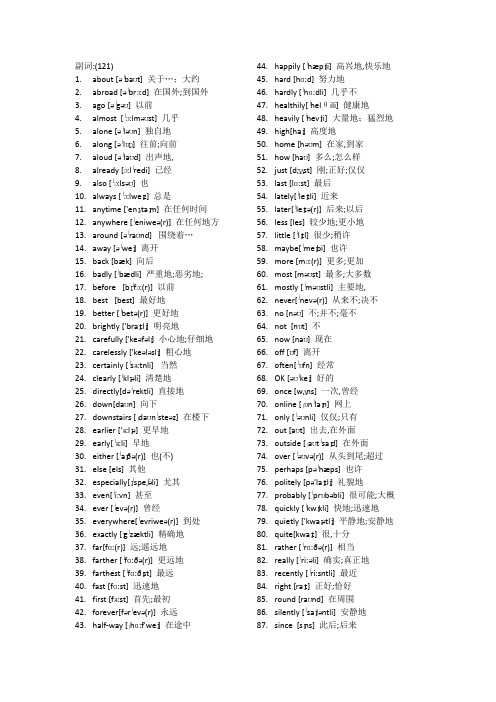
副词:(121)1.about[əˈbaʊt] 关于…;大约2.abroad [əˈbrɔ:d] 在国外;到国外3.ago [əˈgəʊ] 以前4.almost[ˈɔ:lməʊst] 几乎5.alone [əˈləʊn] 独自地6.along[əˈlɒŋ] 往前;向前7.aloud [əˈlaʊd] 出声地,8.already[ɔ:lˈredi] 已经9.also [ˈɔ:lsəʊ] 也10.always [ˈɔ:lweɪz] 总是11.anytime ['enɪˌtaɪm] 在任何时间12.anywhere[ˈeniweə(r)] 在任何地方13.around [əˈraʊnd] 围绕着…14.away [əˈweɪ] 离开15.back[bæk] 向后16.badly [ˈbædli] 严重地;恶劣地;17.before[bɪˈfɔ:(r)] 以前18.best[best] 最好地19.better [ˈbetə(r)] 更好地20.brightly['braɪtlɪ] 明亮地21.carefully ['keəfəlɪ] 小心地;仔细地22.carelessly['keələslɪ] 粗心地23.certainly [ˈsɜ:tnli] 当然24.clearly[ˈklɪəli] 清楚地25.directly[dəˈrektli] 直接地26.down[daʊn] 向下27.downstairs[ˌdaʊnˈsteəz] 在楼下28.earlier ['ɜ:lɪə] 更早地29.early[ˈɜ:li] 早地30.either[ˈaɪðə(r)] 也(不)31.else[els] 其他32.especially[ɪˈspeʃəli] 尤其33.even[ˈi:vn] 甚至34.ever[ˈevə(r)] 曾经35.everywhere[ˈevriweə(r)] 到处36.exactly[ɪgˈzæktli] 精确地37.far[fɑ:(r)] 远;遥远地38.farther[ˈfɑ:ðə(r)] 更远地39.farthest[ˈfɑ:ðɪst] 最远40.fast[fɑ:st] 迅速地41.first[fɜ:st] 首先;最初42.forever[fərˈevə(r)] 永远43.half-way[ˌhɑ:f'weɪ] 在途中44.happily[ˈhæpɪli] 高兴地,快乐地45.hard[hɑ:d] 努力地46.hardly[ˈhɑ:dli] 几乎不47.healthily[ˈhelθili] 健康地48.heavily[ˈhevɪli] 大量地;猛烈地49.high[haɪ] 高度地50.home[həʊm] 在家,到家51.how[haʊ] 多么;怎么样52.just[dʒʌst] 刚;正好;仅仅st[lɑ:st] 最后tely[ˈleɪtli] 近来ter[ˈleɪtə(r)] 后来;以后56.less[les] 较少地;更小地57.little[ˈlɪtl] 很少;稍许58.maybe[ˈmeɪbi] 也许59.more[mɔ:(r)] 更多;更加60.most[məʊst] 最多;大多数61.mostly[ˈməʊstli] 主要地,62.never[ˈnevə(r)] 从来不;决不63.no[nəʊ] 不;并不;毫不64.not[nɒt] 不65.now[naʊ] 现在66.off[ɒf] 离开67.often[ˈɒfn] 经常68.OK[əʊˈkeɪ] 好的69.once[wʌns] 一次,曾经70.online[ˌɒnˈlaɪn] 网上71.only[ˈəʊnli] 仅仅;只有72.out[aʊt] 出去,在外面73.outside[ˌaʊtˈsaɪd] 在外面74.over[ˈəʊvə(r)] 从头到尾;超过75.perhaps[pəˈhæps] 也许76.politely[pə'laɪtlɪ] 礼貌地77.probably[ˈprɒbəbli] 很可能;大概78.quickly[ˈkwɪkli] 快地;迅速地79.quietly['kwaɪətlɪ] 平静地;安静地80.quite[kwaɪt] 很,十分81.rather[ˈrɑ:ðə(r)] 相当82.really[ˈri:əli] 确实;真正地83.recently[ˈri:sntli] 最近84.right[raɪt] 正好;恰好85.round[raʊnd] 在周围86.silently[ˈsaɪləntli] 安静地87.since[sɪns] 此后;后来88.slow[sləʊ] 缓慢89.slowly[ˈsləʊli] 慢慢地90.someday['sʌmdeɪ] 有一天、有朝一日91.sometime[ˈsʌmtaɪm] 在(未来)某时92.sometimes[ˈsʌmtaɪmz] adv.有时候93.somewhere[ˈsʌmweə(r)] adv.在某处94.soon[su:n] 不久;很快95.still[stɪl] 平静地;仍然96.straight[streɪt] 直(接);一直97.successfully[sək'sesfəlɪ]圆满地,顺利地,成功地98.suddenly[ˈsʌdənli] 突然99.sure[ʃʊə(r)] 的确;当然100.then[ðen] 然后;那时101.there[ðeə(r)] 那里;(引导词,无词义) 102.today[təˈdeɪ] 今天103.together[təˈgeðə(r)] 共同;一起104.tomorrow[təˈmɒrəʊ] 明天(见)105.tonight[təˈnaɪt] 今晚106.too[tu:] 也;太107.twice[twaɪs] 两次;两倍108.up[ʌp] 向上109.upstairs[ˌʌpˈsteəz]在楼上;向楼上;楼上ually[ˈju:ʒuəli] 通常111.very[ˈveri] 非常112.when[wen] 什么时候;…的时候113.whenever[wenˈevə(r)] 无论何时114.where[weə(r)] 在哪里115.wherever[weərˈevə(r)] 无论在哪里116.worse[wɜ:s] 更坏地;更差地117.worst[wɜ:st] 最坏地;最恶劣地118.Yeah [jeə] 耶119.yes[jes] 是的;是吗120.yesterday[ˈjestədeɪ] 昨天121.yet[jet] 仍;至今;更;还(没有)。
初中英语中考常用九类词性的定义及归纳

初中常用的9类词性的定义及归纳词类又叫词性,英语单词根据其在句子中的功用,可以分成十个大类。
1.名词noun n. student 学生2.代词pronoun pron. you 你3.形容词adjective adj. happy 高兴的4.副词adverb adv. quickly 迅速地5.动词verb v. cut 砍、割6.数词numeral num. three 三7.冠词article art. a 一个8.介词preposition prep. at 在...9.连词conjunction conj. and 和10.感叹词interjection interj. oh 哦前六类叫实词(能够单独充当句法成分,有词汇意义和语法意义的是实词),后四类叫虚词(不能充当句法成分,没有词汇意义只有语法意义)。
一、名词1.名词复数的规则变化2.名词的格在英语中有些名词可以加“’s”来表示所有关系,带这种词尾的名词形式称为该名词的所有格,如:a teacher’s book。
3.名词所有格的规则如下:1)单数名词词尾加“’s”,复数名词词尾没有s,也要加“’s”,如the boy’s bag 男孩的书包,men’s room 男厕所。
2)若名词已有复数词尾-s ,只加“’”,如:the workers’ struggle工人的斗争。
二、代词大多数代词具有名词和形容词的功能。
英语中的代词,按其意义、特征及在句中的作用分为:人称代词、物主代词、指示代词、反身代词、相互代词、疑问代词、关系代词、连接代词和不定代词九种。
1.人称代词的用法:I saw her with them,at least,I thought it was her.我看到她和他们在一起,至少我认为是她。
(her做宾语,them做介词宾语,her作主补)a. -- Who broke the vase?--谁打碎了花瓶?b. -- Me.--我。
初中英语副词总结归纳大全
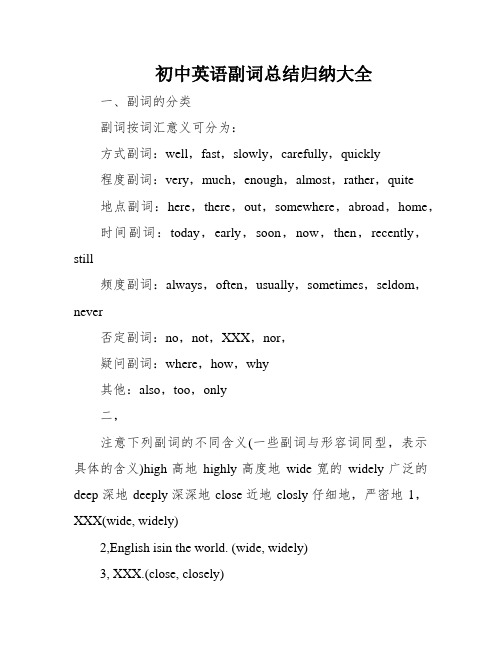
初中英语副词总结归纳大全一、副词的分类副词按词汇意义可分为:方式副词:well,fast,slowly,carefully,quickly程度副词:very,much,enough,almost,rather,quite地点副词:here,there,out,somewhere,abroad,home,时间副词:today,early,soon,now,then,recently,still频度副词:always,often,usually,sometimes,seldom,never否定副词:no,not,XXX,nor,疑问副词:where,how,why其他:also,too,only二,注意下列副词的不同含义(一些副词与形容词同型,表示具体的含义)high高地highly高度地wide宽的widely广泛的deep深地deeply深深地close近地closly仔细地,严密地1,XXX(wide, widely)2,English isin the world. (wide, widely)3, XXX.(close, closely)4, Watch him(close, closely)5, XXX was flying.(high, highly)6, XXX(high, highly)7, XXX.(deep, deeply)7, XXX(deep, deeply)两种形式的副词含义迥异。
XXX迟,晚XXX最近hard勉力的,艰苦地hardly几乎不just方才,仅仅,正好justly公道地,合理地most很,最mostly主要地almost几乎,差不多三,其它副词比较:1, already与yet的区分already用于一定句句中,透露表现“已经”;yet用于否认句句末,透露表现“还”,用于疑问句句末,透露表现“已经”比方,He had already left when I called.当我给他打德律风时,他已经离开了。
初中英语副词总结归纳大全
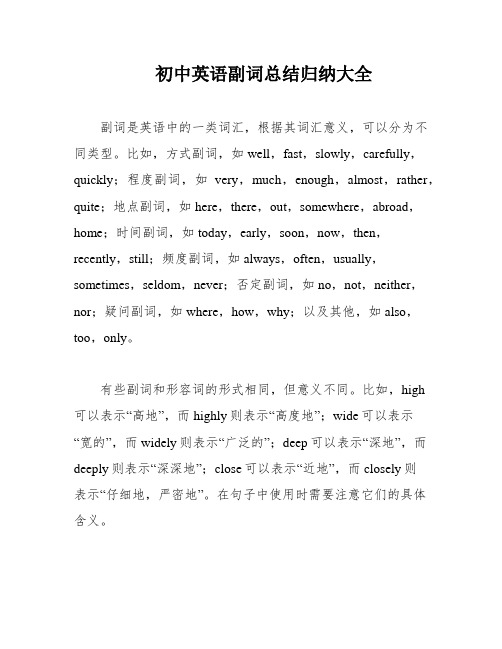
初中英语副词总结归纳大全副词是英语中的一类词汇,根据其词汇意义,可以分为不同类型。
比如,方式副词,如well,fast,slowly,carefully,quickly;程度副词,如very,much,enough,almost,rather,quite;地点副词,如here,there,out,somewhere,abroad,home;时间副词,如today,early,soon,now,then,recently,still;频度副词,如always,often,usually,sometimes,seldom,never;否定副词,如no,not,neither,nor;疑问副词,如where,how,why;以及其他,如also,too,only。
有些副词和形容词的形式相同,但意义不同。
比如,high可以表示“高地”,而highly则表示“高度地”;wide可以表示“宽的”,而widely则表示“广泛的”;deep可以表示“深地”,而deeply则表示“深深地”;close可以表示“近地”,而closely则表示“仔细地,严密地”。
在句子中使用时需要注意它们的具体含义。
还有一些副词虽然形式不同,但意义相近。
比如,XXX表示“迟,晚”,而XXX则表示“最近”;hard表示“努力的,艰苦地”,而hardly则表示“几乎不”;just可以表示“刚刚,仅仅,恰好”,而justly则表示“公正地,正当地”;most可以表示“很,最”,而mostly则表示“主要地”,而almost则表示“几乎,差不多”。
最后,需要注意一些副词的区别。
比如,already用于肯定句中,表示“已经”,而yet用于否定句末,表示“还”,用于疑问句末,表示“已经”。
例如,“He had already left when I called.”(当我给他打电话时,他已经离开了。
)Have you found your ruler yet。
人教版九年级英语副词表
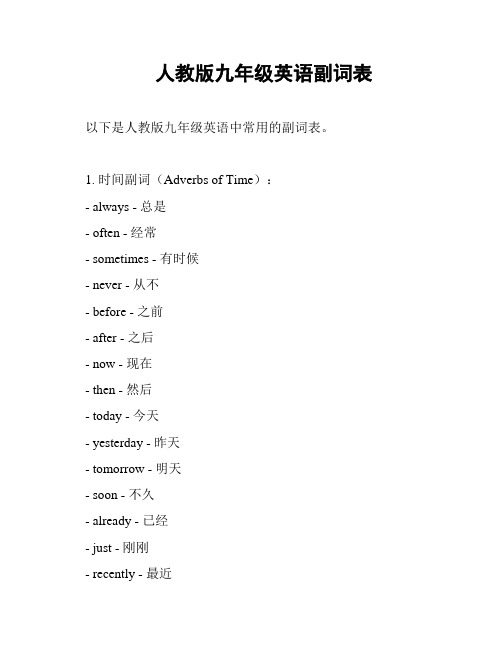
人教版九年级英语副词表以下是人教版九年级英语中常用的副词表。
1. 时间副词(Adverbs of Time):- always - 总是- often - 经常- sometimes - 有时候- never - 从不- before - 之前- after - 之后- now - 现在- then - 然后- today - 今天- yesterday - 昨天- tomorrow - 明天- soon - 不久- already - 已经- just - 刚刚- recently - 最近- ever - 曾经2. 地点副词(Adverbs of Place):- here - 这里- there - 那里- everywhere - 到处- nowhere - 无处- outside - 外面- inside - 里面- upstairs - 楼上- downstairs - 楼下- nearby - 附近- far - 远3. 方式副词(Adverbs of Manner):- well - 好地- badly - 坏地- slowly - 慢慢地- quickly - 快速地- carefully - 小心地- happily - 快乐地- loudly - 大声地- quietly - 安静地- easily - 容易地- hard - 努力地4. 程度副词(Adverbs of Degree):- very - 非常- extremely - 极其- quite - 相当- too - 太- enough - 足够- nearly - 几乎- almost - 差不多- even - 甚至- just - 只是5. 频率副词(Adverbs of Frequency):- always - 总是- usually - 通常- often - 经常- sometimes - 有时候- never - 从不- rarely - 很少- seldom - 很少- occasionally - 偶尔- hardly ever - 几乎不- once - 一次这些副词在句子中用来修饰动词、形容词或其他副词,增强句子的表达力和准确性。
中考英语必会的70个副词
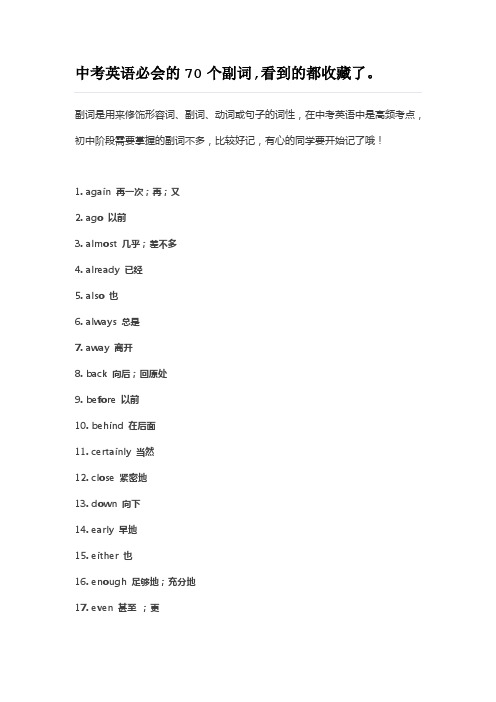
中考英语必会的70个副词,看到的都收藏了。
副词是用来修饰形容词、副词、动词或句子的词性,在中考英语中是高频考点,初中阶段需要掌握的副词不多,比较好记,有心的同学要开始记了哦!1. again 再一次;再;又2. ago 以前3. almost 几乎;差不多4. already 已经5. also 也6. always 总是7. away 离开8. back 向后;回原处9. before 以前10. behind 在后面11. certainly 当然12. close 紧密地13. down 向下14. early 早地15. either 也16. enough 足够地;充分地17. even 甚至;更18. ever 曾经;无论何时19. everywhere 到处20. far 远地21. fast 快地22. first 最初23. hard 努力地;(下雨/ 下雪等)猛烈地24. hardly 几乎不25. here 这里;在这里;向这里26. home 回家;到家27. how 怎样;多么28. in 在家;向内29. instead 相反30. just 正好;刚刚;仅31. late 迟地;晚地32. later 之后;后来33. left 向左34. little 几乎不35. loud 大声地36. much 非常37. neither 也不38. never 决不;从来不39. not 不40. now 现在41. off 离开,掉落42. often 经常43. on 进行中44. once 从前45. only 只;仅仅46. over 结束47. perhaps 可能;也许48. quickly 快地;迅速地49. quite 完全;十分50. rather 相当;宁可51. really 真正地;确实52. since 自从那时以来53. slowly 慢地54. so 如此55. sometimes 有时56. soon 很快;不久57. still 仍然;还58. suddenly 突然59. then 那时;然后60. there 在(往)那儿;表示“存在”61. today 今天;现今62. together 一起63. tomorrow 明天64. tonight 今天晚上65. too 也;太66. twice 两次;两倍67. usually 通常68. very 很;非常69. well 好地70. when 在什么时候71. where 在(往)哪里72. why 为什么73. yes 是74. yet 还;仍然;但是。
初中英语单词重点副词大全

初中英语单词重点副词大全1. always [ˈɔːlweɪz] 始终;总是Tom is always late for school.汤姆上学总是迟到。
2. never [ˈnevər] 从不I never eat fast food.我从不吃快餐。
3. sometimes [ˈsʌmtaɪmz] 有时候We sometimes go to the park on weekends.我们有时候在周末去公园。
4. often [ˈɔːfn] 经常She often helps her mother with the housework.她经常帮忙做家务。
5. usually [ˈjuːʒuəli] 通常We usually have dinner at 6 o'clock.我们通常在六点吃晚饭。
6. occasionally [əˈkeɪʒənəli] 偶尔;有时I occasionally go swimming in summer.我夏天偶尔去游泳。
7. rarely [ˈreərli] 很少;不常He rarely watches TV.他很少看电视。
8. seldom [ˈseldəm] 很少;不常She seldom goes to the movies.她很少去电影院。
9. already [ɔːlˈredi] 已经I have already finished my homework.我已经完成作业了。
10. yet [jet] 尚未Have you finished your breakfast yet?你早餐吃完了吗?11. still [stɪl] 仍然The baby is still sleeping.那个宝宝还在睡觉。
12. just [dʒʌst] 刚刚I have just arrived at the airport.我刚刚到达机场。
13. really [ˈriːəli] 真地;非常The movie was really exciting.那部电影真的很 ** 。
- 1、下载文档前请自行甄别文档内容的完整性,平台不提供额外的编辑、内容补充、找答案等附加服务。
- 2、"仅部分预览"的文档,不可在线预览部分如存在完整性等问题,可反馈申请退款(可完整预览的文档不适用该条件!)。
- 3、如文档侵犯您的权益,请联系客服反馈,我们会尽快为您处理(人工客服工作时间:9:00-18:30)。
兼有两种形式的副词
1) close与closely
close意思是\"近\";closely 意思是\"仔细地\"。
例如: He is sitting close to me. 他就坐在我边上。
Watch him closely. 盯着他。
2) late 与lately
late意思是\"晚\";lately 意思是\"最近\"。
例如: You have come too late. 你来得太晚了。
What have you been doing lately? 近来好吗?
3) deep与deeply
deep意思是\"深\",表示空间深度;deeply时常表示感情上的深度,\"深深地\"。
例如: He pushed the stick deep into the mud.他把棍子深深插进泥里。
Even father was deeply moved by the film.老爸也被电影深深打动了。
4) high与highly
high表示空间高度;highly表示程度,相当于much。
例如: The plane was flying high. 这架飞机飞得很高。
I think highly of your opinion. 你的看法很有道理。
5) wide与widely
wide表示空间宽度;widely意思是\"广泛地\",\"在许多地方\"。
例如: He opened the door wide. 他把门开得大大的。
English is widely used in the world.英语在世界范围内广泛使用。
6) free与freely
free的意思是\"免费\";freely 的意思是\"无限制地\"。
例如:
You can eat free in my restaurant whenever you like.无论什么时候,我这饭铺免费对你开
英语副词练习
一.将下列各句中的形容词变为副词,并将句中其他须更改的地方重写。
例:Mary is a slow worker.
-Mary works slowly.
1. John is a careless driver.
2. She gave a merry laugh.
3. He lived a happy life.
4. Mr. Hang is a quick walker.
5. I can speak good English.
6. They wrote excellent Spanish.
7. He gave the boy a rough push.
8. He is always a willing helper.
9. You gave a wrong answer.
10. The president made a successful speech.
三,判别划线的词是形容词还是副词:
1. I’m afraid he's driving much too fast.
He may be a fast driver, but it’s safer to drive more slowly, I think.
2. Well, that's a hard job for me.
Don't be too hard on him, he’s only a child.
He likes his eggs boiled hard.
3. I’m dead tired.
He threw himself on the bed, more dead than alive.
4. Is there enough food for every one?
He dealt with the matter fairly enough.
5. In order to catch the early bus, she got up very early that morning. 四,改正下列句中的错误
1. My parents often have told me that I should hard study.
2. Let us this afternoon meet at two o’clock in front of the school gate.
3. You have enough said for the moment about your trouble. .
4. Jim is hardly never late.
5. Mary and I generally always arrive on time.
6. They every now and then come to stay with us.
7. I'm quite really certain that he has made again a mistake.
8. My sister speaks English good.
9. His father nearly always goes to the movies on Sunday.
10. Tom quickly picked up it and went off fast.
参考答案:英语副词练习
一 .
1. John drives carelessly.
2. She laughed merrily.
3. He lived happily.
4. Mr. Zhang walks quickly.
5. I can speak English well.
6. They wrote Spanish excellently.
7. He pushed the boy roughly.
8. He always helps others willingly.
9. You answered wrongly.
10. The president spoke successfully.
二. 1. Helen is still working, has not yet retired.
2. What you said this morning was absolutely right.
3. Jane is a rather pretty girl.
4. He always talks very fast.
5. Certainly you don't want as much as that.
o.-"I have rarely seen a worse piece of work."
-"I have never. "
7. None of us has ever been there before and we never wanted to go again.
8. The film has just begun. .
9. He is the only one in this country who knows about ancient Greek.
10. A few of the young men hardly work.
三,
1.恐怕他车开得太快了。
(fast副词)
他可能是个开快车的人,但是我认为开得慢一些来得安全。
(fast形容词)2.嘿,对我来说那是一项困难的工作。
(hard形容词)
不要对他太厉害了,他仅仅是个孩子。
(hard形容词)
他喜欢鸡蛋煮得老点。
(hard副词)
3.累死了!(dead副词)
他往床上一躺,象死了一般。
(dead形容词)
4.每人都有足够的食物吗?(enough形容词)
他非常充分地安排了这件事。
(enough副词)
5.为了赶上早班车,她那天早晨起得很早。
(形容词;副词)
四
1. hard study →Study hard.
2. this afternoon meet at two o'clock →meet at two o'clock this afternoon.
3. enough said →said enough.
4. hardly去掉
5. generally去掉
6. every now and then come to stay with us →come to stay with us every now and then.
7. really去掉, made again a mistake →made a misstate again.
8. good →well.
9. nearly去掉
10. quickly picked up it →picked it up quickly,
fast →at once。
